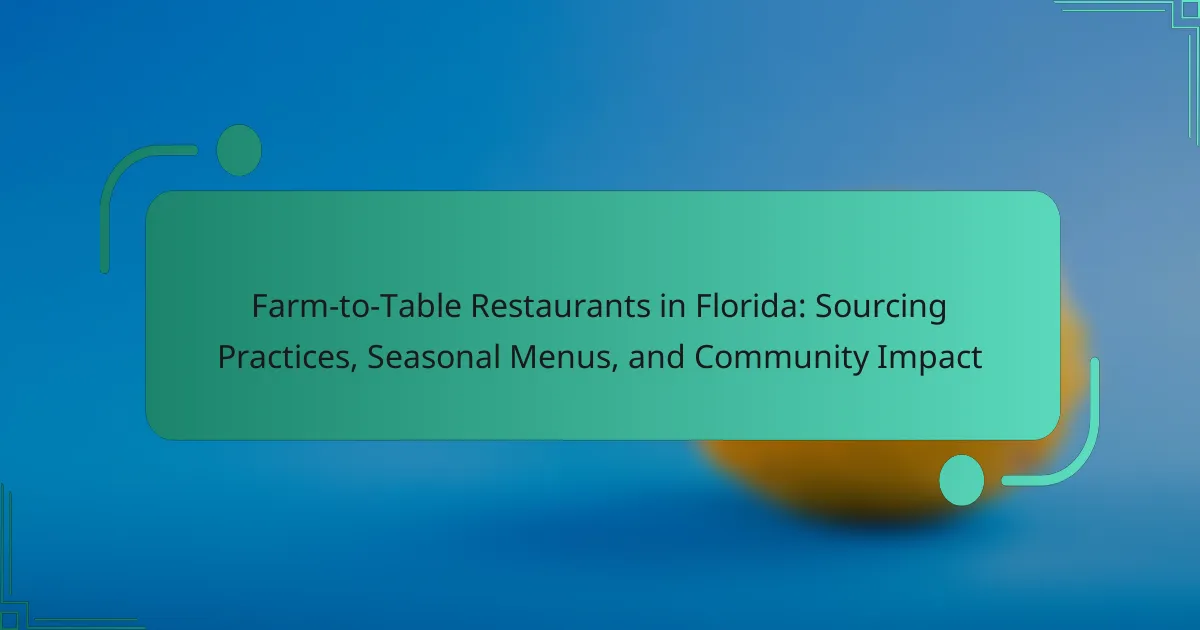Farm-to-table restaurants in Florida are dining establishments that prioritize sourcing ingredients directly from local farms, emphasizing seasonal produce and sustainable practices. These restaurants aim to provide fresh, high-quality meals while supporting local agriculture and fostering community relationships among chefs, farmers, and consumers. The article explores the benefits of farm-to-table dining, including its positive impact on local economies and environmental sustainability, as well as the challenges these restaurants face, such as seasonal availability of ingredients and regulatory hurdles. Additionally, it highlights how these establishments promote healthier eating habits and educate consumers about food origins, contributing to vibrant communities in Florida.

What are Farm-to-Table Restaurants in Florida?
Farm-to-table restaurants in Florida are dining establishments that prioritize sourcing ingredients directly from local farms. These restaurants emphasize seasonal produce and sustainable practices. They aim to provide fresh, high-quality meals while supporting local agriculture. Many farm-to-table restaurants in Florida feature menus that change regularly based on available ingredients. This approach fosters community relationships between chefs, farmers, and consumers. It also promotes environmental sustainability by reducing transportation emissions. Florida’s diverse climate allows for a wide variety of local produce, enhancing the farm-to-table experience.
How do Farm-to-Table Restaurants differ from traditional dining establishments?
Farm-to-table restaurants prioritize sourcing ingredients directly from local farms. This practice contrasts with traditional dining establishments that often rely on mass-produced or frozen foods. Farm-to-table menus change seasonally, reflecting the availability of fresh produce. Traditional restaurants typically maintain a consistent menu throughout the year. Farm-to-table dining emphasizes sustainability and supports local economies. Traditional dining may not prioritize these values and can have a broader supply chain. Research shows that farm-to-table restaurants enhance food quality and flavor due to fresher ingredients. The direct relationship with local farmers fosters community engagement and transparency about food origins.
What defines the farm-to-table concept in the context of Florida?
The farm-to-table concept in Florida is defined by sourcing food directly from local farms. This approach emphasizes fresh, seasonal ingredients. Florida’s diverse agriculture supports a variety of produce, seafood, and meats. Restaurants often build relationships with local farmers. This ensures quality and sustainability in their offerings. The concept promotes community engagement and supports the local economy. Furthermore, it reduces environmental impact by minimizing transportation. Florida’s climate allows year-round growing, enhancing menu diversity. This connection between producers and consumers is central to the farm-to-table philosophy.
Why is local sourcing important for these restaurants?
Local sourcing is important for farm-to-table restaurants because it enhances food freshness and quality. By sourcing ingredients locally, restaurants can serve produce that is harvested at peak ripeness. This results in better flavor and nutritional value. Local sourcing also supports regional farmers and boosts the local economy. According to a study by the American Farmland Trust, every dollar spent on local food generates an additional $1.76 in local economic activity. Furthermore, it reduces carbon footprints associated with long-distance food transportation. Restaurants can create seasonal menus that reflect local harvests, promoting sustainability. Ultimately, local sourcing fosters community connections between diners and producers.
What are the key sourcing practices used by Farm-to-Table Restaurants in Florida?
Farm-to-table restaurants in Florida primarily source ingredients directly from local farms. This practice ensures the freshness and quality of the produce served. Many restaurants establish partnerships with nearby farms to create a reliable supply chain. Seasonal sourcing is also crucial, as it aligns menu offerings with the availability of local produce. Additionally, some restaurants participate in community-supported agriculture (CSA) programs. These programs allow consumers to buy shares of a farm’s harvest, ensuring restaurants receive fresh ingredients. Transparency in sourcing is emphasized, with many establishments highlighting their suppliers on menus. This approach supports local economies and reduces carbon footprints associated with transportation. Overall, these practices foster a strong connection between diners and local agriculture.
How do these restaurants select their local suppliers?
Farm-to-table restaurants in Florida select local suppliers based on quality, sustainability, and community relationships. They prioritize suppliers who provide fresh, seasonal ingredients. Many restaurants conduct site visits to assess farming practices. They often choose suppliers who use organic or regenerative farming methods. Restaurants may also consider the supplier’s ability to meet specific demands. This includes consistent quality and reliable delivery schedules. Relationships with local farmers foster trust and collaboration. Transparency in sourcing practices is essential for restaurants to communicate their values to customers.
What criteria do they use to ensure quality and sustainability?
Farm-to-table restaurants in Florida ensure quality and sustainability through local sourcing, seasonal menus, and organic practices. They prioritize ingredients from nearby farms to reduce carbon footprints. Restaurants often select suppliers who adhere to sustainable farming methods. They also emphasize the use of organic produce, which minimizes pesticide use. Many establishments engage in community-supported agriculture (CSA) programs. This fosters a direct relationship with local farmers. Regular menu updates reflect seasonal availability, promoting freshness. These practices align with consumer demand for transparency and environmental responsibility.
How do seasonal menus impact the dining experience in Farm-to-Table Restaurants?
Seasonal menus significantly enhance the dining experience in Farm-to-Table Restaurants. They provide fresh ingredients that are at their peak flavor and nutritional value. This freshness leads to more vibrant and tasty dishes. Seasonal menus also reflect local agricultural cycles, connecting diners to their region’s produce. This connection fosters a sense of community and supports local farmers. Additionally, seasonal offerings can create excitement and anticipation for new dishes. Research shows that diners appreciate the novelty and variety that seasonal menus bring. Overall, seasonal menus enrich the culinary experience and promote sustainable practices.
What are the benefits of seasonal menus for customers?
Seasonal menus provide customers with fresh, high-quality ingredients. These ingredients are often harvested at their peak flavor and nutritional value. Seasonal menus also support local farmers and sustainable practices. This connection enhances the community’s economy and promotes environmental responsibility. Additionally, seasonal offerings create variety in dining experiences. Customers enjoy trying new dishes that reflect current produce availability. Research shows that seasonal menus can increase customer satisfaction and loyalty. A study by the National Restaurant Association highlights that 70% of diners prefer restaurants that use local ingredients.
How do seasonal ingredients influence menu creativity?
Seasonal ingredients significantly enhance menu creativity in farm-to-table restaurants. They provide chefs with fresh, locally sourced produce that reflects the time of year. This freshness allows for vibrant flavors and unique dishes. Seasonal ingredients often inspire innovative recipes that highlight their natural qualities. For example, summer ingredients like tomatoes and basil can lead to fresh salads and light pastas. The use of seasonal produce also encourages chefs to adapt menus regularly. This adaptability keeps the dining experience exciting for customers. Furthermore, sourcing these ingredients supports local farmers and promotes sustainability. In Florida, where diverse crops are available year-round, this practice fosters a strong connection between chefs and the community.

What is the community impact of Farm-to-Table Restaurants in Florida?
Farm-to-table restaurants in Florida positively impact local communities. They support local farmers by sourcing ingredients directly from them. This practice boosts the local economy and encourages sustainable agriculture. These restaurants promote seasonal menus, which highlight fresh, local produce. This approach reduces transportation costs and carbon footprints. Additionally, farm-to-table dining fosters community connections. It educates consumers about food origins and promotes healthier eating habits. Research shows that communities with farm-to-table restaurants report increased local engagement and pride. Overall, these establishments contribute to vibrant, sustainable communities in Florida.
How do these restaurants contribute to local economies?
Farm-to-table restaurants contribute to local economies by sourcing ingredients from nearby farms. This practice supports local agriculture and keeps money within the community. According to a study by the American Farm Bureau Federation, local sourcing can increase revenue for farmers by up to 30%. Additionally, these restaurants create jobs in food service and related sectors. A report from the National Restaurant Association states that the restaurant industry employs over 10 million people nationwide. By fostering a connection between consumers and local producers, farm-to-table restaurants enhance community engagement and promote sustainable practices. This results in a stronger local economy overall.
What role do they play in supporting local farmers and producers?
Farm-to-table restaurants play a crucial role in supporting local farmers and producers. They source ingredients directly from these local agricultural businesses. This practice helps sustain the local economy by providing farmers with consistent revenue. Additionally, it promotes the use of seasonal produce, which can enhance the freshness and flavor of the dishes served. By prioritizing local sourcing, these restaurants reduce transportation costs and environmental impact. Studies show that farm-to-table initiatives can increase farmers’ profits by up to 30%. This relationship fosters a community-oriented food system that benefits both consumers and producers.
How do they create job opportunities within the community?
Farm-to-table restaurants in Florida create job opportunities within the community by sourcing ingredients locally and hiring local staff. They foster relationships with nearby farmers, which supports agricultural jobs. These restaurants often employ chefs, servers, and kitchen staff from the local area. They also create jobs in food distribution and supply chain management by partnering with local producers. According to the Florida Department of Agriculture, local sourcing can increase employment in agriculture-related sectors. Additionally, farm-to-table initiatives promote tourism, further boosting local employment in hospitality and service industries.
In what ways do Farm-to-Table Restaurants promote sustainable practices?
Farm-to-Table restaurants promote sustainable practices by sourcing ingredients directly from local farmers. This reduces transportation emissions associated with food delivery. They often prioritize organic and seasonal produce, which minimizes the use of harmful pesticides and supports biodiversity. Many Farm-to-Table establishments engage in waste reduction strategies, such as composting food scraps. They also educate consumers about the benefits of local eating. Research indicates that local sourcing can significantly lower carbon footprints. Additionally, these restaurants often support local economies by investing in nearby farms. This creates a community-centric food system that fosters sustainability.
What initiatives do they undertake to reduce waste?
Farm-to-table restaurants in Florida undertake several initiatives to reduce waste. They implement composting programs to recycle organic waste. This process diverts food scraps from landfills. Many also practice portion control to minimize leftovers. They source ingredients locally, reducing transportation waste. Some restaurants partner with local farms to repurpose unsold produce. Additionally, they use biodegradable packaging for takeout services. These actions collectively contribute to a sustainable dining experience.
How do they educate customers about sustainability?
Farm-to-table restaurants in Florida educate customers about sustainability through various methods. They provide information on sourcing practices directly on menus. This includes details about local farms and seasonal ingredients. Many restaurants host workshops and events focused on sustainable practices. They often share educational materials online through blogs and social media. Some establishments collaborate with local organizations to promote sustainability awareness. Additionally, they may offer farm tours to connect customers with food sources. This hands-on approach reinforces the importance of sustainability in food choices.

What challenges do Farm-to-Table Restaurants face in Florida?
Farm-to-table restaurants in Florida face several challenges. Sourcing local ingredients can be difficult due to seasonal availability. Weather conditions, such as hurricanes, can disrupt supply chains. Additionally, competition with larger distributors affects pricing and access to fresh produce. Regulatory hurdles, including food safety regulations, can complicate operations. Limited consumer awareness about the benefits of local sourcing can impact demand. Lastly, maintaining consistent quality from local farms is often a concern for these restaurants.
How do seasonal fluctuations affect operations?
Seasonal fluctuations significantly affect operations in farm-to-table restaurants. These variations influence ingredient availability, impacting menu planning. For instance, summer months may yield an abundance of tomatoes, while winter could limit fresh produce options. Consequently, chefs must adapt menus to reflect seasonal ingredients. This adaptation can enhance dish freshness and flavor. Furthermore, seasonal changes can affect customer demand patterns. For example, warmer weather may increase the desire for lighter fare. Research indicates that restaurants reporting seasonal menus often experience higher customer satisfaction. This satisfaction can lead to increased patronage and loyalty. Overall, effective management of seasonal fluctuations is crucial for operational success in farm-to-table restaurants.
What strategies do restaurants implement to manage supply chain issues?
Restaurants implement several strategies to manage supply chain issues. They often establish direct relationships with local farmers and suppliers. This approach reduces reliance on larger distributors and enhances product freshness. Additionally, restaurants may diversify their supplier base to mitigate risks. By sourcing from multiple vendors, they can better handle disruptions.
Many restaurants also adopt inventory management systems. These systems help track stock levels and forecast demand accurately. Furthermore, some establishments implement seasonal menus. This allows them to use ingredients that are readily available, minimizing supply chain constraints.
Adapting to market conditions is crucial. Restaurants may adjust their menus based on ingredient availability. This flexibility aids in maintaining operational efficiency. Regular communication with suppliers ensures transparency regarding potential shortages.
In 2021, a survey indicated that 80% of restaurants faced supply chain challenges. Many reported that local sourcing helped them navigate these issues effectively. These strategies demonstrate how restaurants can proactively address supply chain disruptions.
What best practices can be adopted by aspiring Farm-to-Table Restaurants?
Aspiring Farm-to-Table Restaurants should prioritize sourcing local ingredients. This practice supports local farmers and reduces transportation emissions. Establishing relationships with nearby farms ensures freshness and quality. Seasonal menus should reflect the availability of local produce. This approach enhances flavor and promotes sustainability. Transparency with customers about sourcing builds trust and loyalty. Implementing waste reduction strategies, such as composting, minimizes environmental impact. Engaging with the community through events can foster a loyal customer base. These best practices contribute to the restaurant’s success and the local economy.
How can new restaurants effectively build relationships with local suppliers?
New restaurants can effectively build relationships with local suppliers by prioritizing communication and trust. Establishing open lines of communication allows for clear expectations and feedback. Regular visits to suppliers’ farms or facilities can strengthen these connections. Engaging in local events or farmers’ markets fosters community ties. Offering fair prices encourages suppliers to prioritize the restaurant. Collaborating on seasonal menus showcases local produce and creates shared marketing opportunities. Consistent orders build reliability and loyalty over time. According to the National Restaurant Association, 71% of consumers are more likely to support restaurants that source locally. This statistic highlights the mutual benefits of strong supplier relationships.
What are some tips for creating a successful seasonal menu?
To create a successful seasonal menu, focus on using fresh, locally sourced ingredients. This approach enhances flavor and supports local farmers. Incorporate items that reflect the current season, such as summer vegetables or winter root crops. Highlighting these ingredients can attract customers interested in seasonal dining experiences. Additionally, consider the balance of flavors and textures in each dish. Seasonal menus should also be flexible to adapt to ingredient availability. Regularly updating the menu keeps it exciting and encourages repeat visits. Finally, engaging with customers about the seasonal offerings can increase their interest and appreciation for the menu.
Farm-to-table restaurants in Florida are dining establishments that prioritize sourcing ingredients directly from local farms, emphasizing seasonal produce and sustainable practices. This article explores the key sourcing practices, the impact of seasonal menus on the dining experience, and the broader community effects of these restaurants. It highlights the importance of local sourcing for enhancing food quality, supporting local economies, and promoting environmental sustainability. Additionally, the article addresses the challenges faced by these establishments, best practices for aspiring restaurants, and the role they play in fostering community connections and awareness about food origins.


